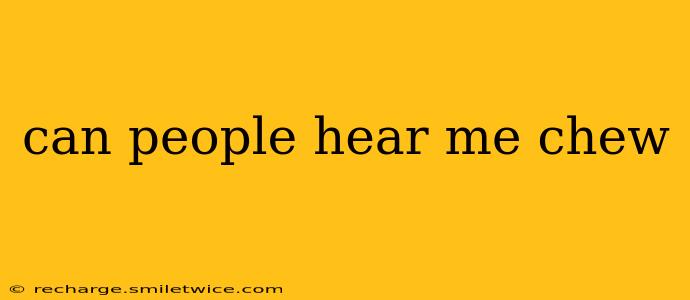Can People Hear Me Chew? The Science of Misophonia and Food Sounds
The question of whether others can hear you chew is multifaceted, touching upon the acoustics of chewing, individual sensitivities, and the psychological phenomenon of misophonia. While the simple answer is sometimes, the specifics depend on several factors.
How Loud is Your Chewing?
The volume of your chewing depends on several factors:
- The food: Crunchy foods like chips or apples naturally produce louder sounds than softer foods like yogurt or mashed potatoes.
- Your chewing style: Aggressive or forceful chewing creates more noise than gentle chewing. Some people naturally chew more loudly than others.
- The environment: A quiet library will amplify sounds more than a bustling restaurant.
Generally, if your chewing is loud enough to be distracting to those around you, they likely can hear it. However, it's important to remember that not all sounds are equally perceived. Some people are more sensitive to certain sounds than others.
What is Misophonia?
This leads us to the fascinating phenomenon of misophonia, a condition where individuals experience extreme aversion to specific sounds, often including eating sounds like chewing, slurping, or clicking. For people with misophonia, even seemingly quiet chewing can be incredibly distressing. This doesn't mean that the sound is inherently loud; it means their neurological response is heightened to these specific sounds.
Are there ways to minimize chewing sounds?
Yes, there are ways to make your chewing less noticeable:
- Choose quieter foods: Opt for softer foods that produce less noise.
- Chew with your mouth closed: This significantly reduces the amount of sound escaping.
- Be mindful of your chewing style: Try to chew gently and deliberately, rather than aggressively.
- Be considerate of your surroundings: In quiet environments, be extra mindful of your chewing.
How can I tell if my chewing is too loud?
There's no foolproof way to know for sure without asking. However, you can gauge your chewing volume by paying attention to your surroundings and the reactions of others. If people seem visibly annoyed or distracted by your chewing, it's a good indication that it's too loud.
Is it rude to chew loudly?
While not everyone is bothered by chewing sounds, it is generally considered good manners to chew quietly and discreetly. Being mindful of the volume of your chewing demonstrates consideration for those around you. This is especially important in formal settings or quiet environments.
Why do some people find chewing sounds so irritating?
The reasons behind this aversion are complex and not fully understood. However, research suggests that misophonia may involve a heightened connection between the auditory cortex (processing sounds) and the limbic system (processing emotions). This can lead to an exaggerated emotional response to trigger sounds, such as chewing.
In conclusion, whether people can hear you chew depends on various factors, but being mindful of your chewing habits and considering the potential impact on others is always a good practice. If you are concerned about your chewing habits, try the tips mentioned above to mitigate any potential disturbances. And remember, for some people, even subtle chewing sounds can be incredibly disruptive due to misophonia.
